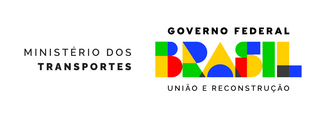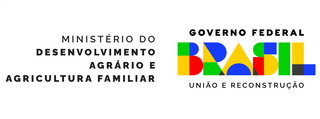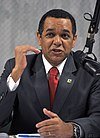
The Cabinet of Brazil, also called Council of Ministers or Council of Government, is composed of the Ministers of State and senior advisors of the executive branch of the federal government of Brazil. Cabinet officers are appointed and dismissed by the President. There are currently twenty-three Ministries, including six Ministry-level offices: the Chief of Staff, General-Secretariat of the Presidency, Secretariat of Institutional Relations, Secretariat of Social Communication, Personal Office of the President of the Republic and the Institutional Security Office. Other institutions also assists the Presidency.

The Ministry of Tourism is a cabinet-level federal ministry created on January 1, 2003. It is responsible for Embratur, the Brazilian Tourist Board.

The Ministry of Culture of Brazil is a cabinet-level federal ministry created in 1985, in the first month of president's José Sarney government, dissolved by Jair Bolsonaro in 2019 and reinstated by Luiz Inácio Lula da Silva in 2023.

The Ministry of Human Rights and Citizenship (MDHC), former Ministry of Woman, Family and Human Rights (2019–2022) and Secretariat for Human Rights of the Presidency of the Republic (1997–2015) is an office attached to the Presidency of Brazil. Its purpose is to implement, promote, and protect human rights, civic rights, and the rights of children, adolescents, women, families, the elderly, and the disabled.

The Ministry of Education, also known as MEC, an initialism derived from its former name Ministry of Education and Culture, is a cabinet-level federal ministry of Brazil.

The Ministry of Transport or Transportation is a cabinet-level federal ministry in Brazil. It is the body responsible to enforce and direct regulations concerning transport, from roads and railways to ports and aviation and it also advises the President of Brazil in the execution and formulation of these policies. It was first established in 1992, during Fernando Collor de Mello's presidency. It was dissolved on 1 January 2019 during Jair Bolsonaro's government and merged into the Ministry of Infrastructure. The first minister to take office into the ministry since its re-creation in 2023 is Renan Filho.

The Ministry of Health is a cabinet-level federal ministry in Brazil. Since January 2023, the Health Minister is Nísia Trindade, a researcher and former chairwoman of Oswaldo Cruz Foundation.

The Institutional Security Bureau is an executive cabinet office of the federal government of Brazil responsible for providing direct assistance at a moment's notice to the President on matters of national security and defense policy. It is currently headed by retired general Marcos Antonio Amaro dos Santos.

The Ministry of Justice and Public Security, previously known as Ministry of Justice and Ministry of Justice and Citizenship, is a cabinet-level federal ministry in Brazil. The current minister is Ricardo Lewandowski.

The Ministry of Cities is a cabinet-level federal ministry in Brazil, created on January 1, 2003.
The Ministry of Fishing and Aquaculture is a cabinet-level federal ministry in Brazil. The ministry reported directly to the President of Brazil in formulating policies and guidelines for the development and promotion of fishing and aquaculture. It was established on January 1, 2003, as the Special Secretariat of Aquaculture and Fisheries. Its elevation to ministry level occurred on June 26, 2009, under Law No. 11,958.

The Ministry of Agrarian Development and Family Agriculture is a cabinet-level federal ministry in Brazil.

The Ministry of Sports is a cabinet-level federal ministry in Brazil. It was established in 1995 as the "Special Ministry of Sports"; in 1998, this became the "Ministry of Sports and Tourism". In 2003, the Ministry of Tourism was separated from its portfolio. The cabinet was extinct by Jair Bolsonaro in 2019, folded into the Ministry of Citizenship, but Luiz Inácio Lula da Silva announced he would restore it in 2023, with Ana Moser as the new minister.

The Ministry of Social Development and Assistance, Family and Fight against Hunger (MSD) is a cabinet-level federal ministry in Brazil.
The Ministry of Social Security is a cabinet-level federal ministry in Brazil. On 2 October 2015, it was fused with the Ministry of Labor and Employment, becoming the Ministry of Labor, Employment and Social Security. It was later recreated by president Luiz Inácio Lula da Silva in 2023. The incumbent minister is Carlos Lupi.
The Secretariat of Institutional Affairs is an agency linked to the Presidency of the Republic of Brazil. It was formed through Provisional Measura no. 259 of 21 July 2005 and converted into Law no. 11204 of 5 December 2005. It acted in the following areas:
- Political coordination of the Government;
- Conduction of the relationship between the Government, the National Congress and political parties;
- Interlocution with States, the Federal District and Municipalities;
- Coordination of the working of the Social and Economic Development Council.

The Ministry of Indigenous Peoples is a cabinet-level federal ministry in Brazil. The ministry was established on 11 January 2023 under the government of Luiz Inácio Lula da Silva to advance and protect the interests of the Indigenous people of Brazil.

Anielle Francisco da Silva is a Brazilian politician from the Workers' Party who has been Minister of Racial Equality in the second cabinet of Lula da Silva since 1 January 2023.

The Ministry of Women, formerly the National Secretariat of Politics for Women, was created as a secretariat with cabinet-level during the first Lula da Silva administration, as a way to ensure that politics for women could have more attention. In 2019, it was fused with the Ministry of Human Rights and became the Ministry of Woman, Family and Human Rights (MMFDH), with an attribution to establish public politics for the enhancement of life of all women, LGBT people, indigenous people, black people of Brazil. The main goal of the Ministry is "[to] promote the equality between men and women and fight against any kind of prejudice and discrimination inherited from a patriarchal and excluding society."

The Ministry of Ports and Airports is a cabinet-level federal ministry in Brazil.
























